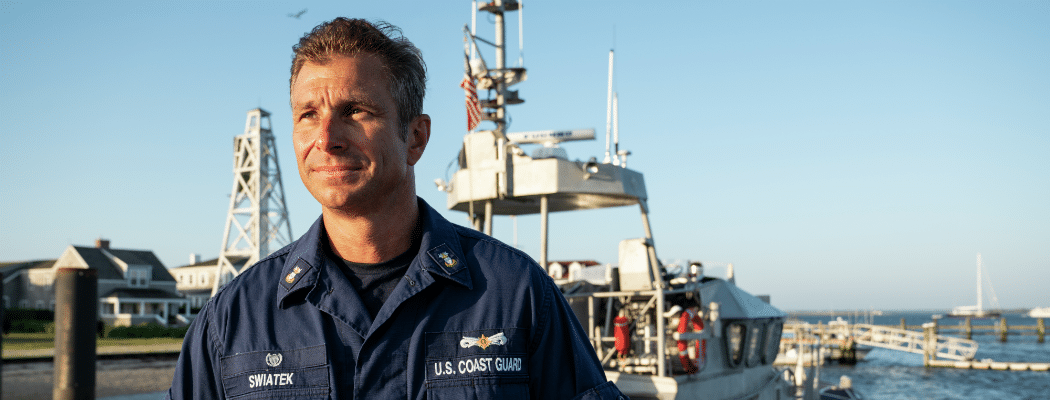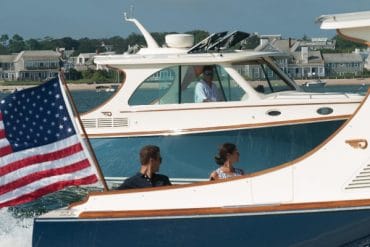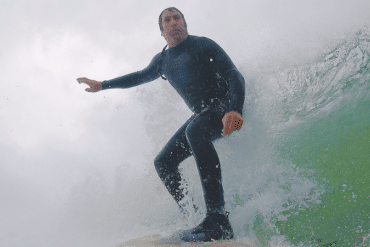As he departs his post at Brant Point this month, Coast Guard Master Chief Chris Swiatek reflects on his career on the water.
 Born in landlocked Cleveland, Ohio, Chris Swiatek wasn’t exactly destined for a life on the open ocean. Yet cruising around the Great Lakes aboard his father’s boat growing up, Swiatek marveled at the Coast Guard cutters patrolling those vast bodies of fresh water and enlisted at the age of nineteen. Upon finishing eight weeks of basic training in Cape May, New Jersey, in 1992, Swiatek had the option of returning home to Cleveland to serve on the Great Lakes or to hit the high seas off the coast of Charleston, South Carolina. He chose the latter. Seven months later, Swiatek was plunging into the Atlantic as a Coast Guard rescue swimmer.
Born in landlocked Cleveland, Ohio, Chris Swiatek wasn’t exactly destined for a life on the open ocean. Yet cruising around the Great Lakes aboard his father’s boat growing up, Swiatek marveled at the Coast Guard cutters patrolling those vast bodies of fresh water and enlisted at the age of nineteen. Upon finishing eight weeks of basic training in Cape May, New Jersey, in 1992, Swiatek had the option of returning home to Cleveland to serve on the Great Lakes or to hit the high seas off the coast of Charleston, South Carolina. He chose the latter. Seven months later, Swiatek was plunging into the Atlantic as a Coast Guard rescue swimmer.
“Everybody joins the Coast Guard because they want to save lives, but often times you come to a ship or a station and you don’t have that opportunity right off the bat,” Swiatek says today, sitting on the aluminum gunnel of a forty-seven-foot motor lifeboat (MLB) tied up in Brant Point where he has served as master chief for the last four years. “But at the age of nineteen, I got thrown right into the mix.”
 On that day in 1992, Swiatek was deployed to save the lives of Haitian refugees who had capsized while fleeing persecution amid the Haitian/Cuban Refugee Crisis. The moment he reached the terrified migrants in the water, Swiatek was swarmed and dragged under. “That was definitely the scariest moment I’ve experienced in the Coast Guard,” he says. “My life flashed before my eyes.” Swiatek pulled the cord to his buoyancy compensating vest, shooting him to the surface where he ultimately calmed the migrants and performed the rescue, saving the lives of an infant and three adults. “I had only been in the Coast Guard for seven months at that point,” reflects Swiatek, who was awarded the Coast Guard’s prestigious Meritorious Service Medal for the rescue. “But your training kicks in. You might have that gut reaction and that feeling of fear, but then you immediately think ‘what do I have to do to help people?’”
On that day in 1992, Swiatek was deployed to save the lives of Haitian refugees who had capsized while fleeing persecution amid the Haitian/Cuban Refugee Crisis. The moment he reached the terrified migrants in the water, Swiatek was swarmed and dragged under. “That was definitely the scariest moment I’ve experienced in the Coast Guard,” he says. “My life flashed before my eyes.” Swiatek pulled the cord to his buoyancy compensating vest, shooting him to the surface where he ultimately calmed the migrants and performed the rescue, saving the lives of an infant and three adults. “I had only been in the Coast Guard for seven months at that point,” reflects Swiatek, who was awarded the Coast Guard’s prestigious Meritorious Service Medal for the rescue. “But your training kicks in. You might have that gut reaction and that feeling of fear, but then you immediately think ‘what do I have to do to help people?’”
Nearly thirty years later, Swiatek is preparing to complete his tenure as master chief at the Coast Guard Station on Brant Point. With a bronze tan and a scar beneath his eye, he cuts the figure of a career Coast Guardsman. No matter how big the waves, no matter how rough the seas, Swiatek has never been seasick. A steel stomach might seem like a prerequisite for a Coastie, but Swiatek says that he’s one of only a handful who can keep their breakfast down when they’re out on training missions in high seas off Nantucket.
 Brant Point is one of the few heavy weather Coast Guard stations in the northeast. When islanders are battening down the hatches during hurricane season or in the throes of a winter Nor’easter, Swiatek and his crew head out in the two MLBs to train. “We’ve been out there in fifteen- to eighteen-foot seas, where the wind is so bad that you can’t breathe when you open your mouth,” Swiatek says. “The ocean will keep you honest…you can’t defeat her.” Lasting six to eight hours, the training missions involve man overboard and vessels-in-distress drills. Taking turns acting as a helpless boat, the Coast Guardsmen hold on as the ocean throws them around like flotsam while their colleagues practice responding to worst-case scenarios.
Brant Point is one of the few heavy weather Coast Guard stations in the northeast. When islanders are battening down the hatches during hurricane season or in the throes of a winter Nor’easter, Swiatek and his crew head out in the two MLBs to train. “We’ve been out there in fifteen- to eighteen-foot seas, where the wind is so bad that you can’t breathe when you open your mouth,” Swiatek says. “The ocean will keep you honest…you can’t defeat her.” Lasting six to eight hours, the training missions involve man overboard and vessels-in-distress drills. Taking turns acting as a helpless boat, the Coast Guardsmen hold on as the ocean throws them around like flotsam while their colleagues practice responding to worst-case scenarios.
“The day-to-day here at the Brant Point Station is training, maintaining, operating,” Swiatek describes. “The biggest event I can think of that happened while I was here was when the Iyanough hit the breakwall in Hyannis last year.” Although the crash happened outside of the Brant Point Station’s Area of Responsibility—which only stretches halfway across Nantucket Sound—Swiatek had a boat underway training in the vicinity. “This boat was the first on scene,” Swiatek says. “When you arrive on the scene first, you’re the on-scene commander—you’re in charge.” More specifically, one of Swiatek’s men, who was in his early twenties, was coordinating a half-dozen other agencies to aid the ferry hung up on the rocks. “That’s one thing I absolutely love about the Coast Guard: You can have someone come out of boot camp, go to school, and then the responsibility they get is nothing else I’ve ever seen,” Swiatek says. “To see the outstanding work they did to coordinate that rescue and evacuate everyone to safety—it was impressive.”
 Although he’s just in his mid-forties, Swiatek is already bearing down on retirement. “You can only be in the Coast Guard for thirty years,” he explains. “So much has happened during that time, so it’s hard to narrow it down to one or two stories. I’ve been involved in so many different things over the years.” Swiatek eventually transferred to a post in California where he spent nine years working in counter narcotics. “I was in charge of three separate patrol boats,” Swiatek describes. “It was very arduous. You were away from home for weeks at a time. The operational tempo was really high and stressful, shooting at drug runners and chasing smugglers.” Cruising around in patrol boats for days and nights on end, Swiatek and his team waited to be radioed intelligence to launch into action. “When you get that call where they spotted a boat heading north, everything amps up,” he recalls. “You’re suddenly going as fast as you can with the ship, you’re handling the radio, talking to helicopters.”
Although he’s just in his mid-forties, Swiatek is already bearing down on retirement. “You can only be in the Coast Guard for thirty years,” he explains. “So much has happened during that time, so it’s hard to narrow it down to one or two stories. I’ve been involved in so many different things over the years.” Swiatek eventually transferred to a post in California where he spent nine years working in counter narcotics. “I was in charge of three separate patrol boats,” Swiatek describes. “It was very arduous. You were away from home for weeks at a time. The operational tempo was really high and stressful, shooting at drug runners and chasing smugglers.” Cruising around in patrol boats for days and nights on end, Swiatek and his team waited to be radioed intelligence to launch into action. “When you get that call where they spotted a boat heading north, everything amps up,” he recalls. “You’re suddenly going as fast as you can with the ship, you’re handling the radio, talking to helicopters.”
In December 2012, Swiatek was ripped awake in the middle of the night with news that a drug runner had killed one of his fellow guardsmen. Chief Petty Officer Terrell Horne III had been in a small inflatable boat chasing a smuggler with another Coastie when the suspect abruptly turned and rammed them head on at high speed. Horne suffered a traumatic brain injury when he got hit by the boat’s prop and was later pronounced dead. “Coast Guardsmen don’t usually die in the line of duty,” reflects Swiatek, who was two years into his appointment as master chief at the time. “I got that call that I had to chase this boat of drug runners down.” Minutes after getting the call, Swiatek was blasting through the darkness, scanning the radar and forward-looking infrared radar to apprehend the killers. The two suspects were eventually arrested and were convicted on federal charges.
 While Swiatek transferred to the Brant Point station in 2016, it wasn’t his first time on patrol around the Cape and the Islands. “I spent a couple years working on a ship out of Woods Hole, in the late nineties,” he explained. “In fact, my daughter was born in Falmouth.” During that time, Swiatek was part of the effort to recover the bodies of John F. Kennedy Jr. and his wife, Carolyn Bessette, and her sister Lauren who were killed in a plane crash in Nantucket Sound in July 1999. After days of searching, Swiatek was aboard the USCG ship that carried members of the Kennedy family back from the Navy’s USS Grasp where they had been briefed on the crash site. Photographers lined the coast as the vessel idled into Woods Hole’s Little Harbor, snap- ping thousands of images. Swiatek came out on the stern to raise an American flag. The next day, the image of him ran on the front page of The Plain Dealer, Swiatek’s home paper back in Cleveland.
While Swiatek transferred to the Brant Point station in 2016, it wasn’t his first time on patrol around the Cape and the Islands. “I spent a couple years working on a ship out of Woods Hole, in the late nineties,” he explained. “In fact, my daughter was born in Falmouth.” During that time, Swiatek was part of the effort to recover the bodies of John F. Kennedy Jr. and his wife, Carolyn Bessette, and her sister Lauren who were killed in a plane crash in Nantucket Sound in July 1999. After days of searching, Swiatek was aboard the USCG ship that carried members of the Kennedy family back from the Navy’s USS Grasp where they had been briefed on the crash site. Photographers lined the coast as the vessel idled into Woods Hole’s Little Harbor, snap- ping thousands of images. Swiatek came out on the stern to raise an American flag. The next day, the image of him ran on the front page of The Plain Dealer, Swiatek’s home paper back in Cleveland.
And that’s where his next stop will be. As a fitting conclusion to his thirty years in the Coast Guard, Swiatek will be patrolling the waters that first inspired him to enlist. Though he looks forward to spending more time with his wife and daughter as well as his parents who still live in Cleveland, leaving Nantucket is bittersweet. “This island has really taken care of us,” he says, walking down the dock back to the station. “I’ve had the opportunity to work with so many people in the town and they’ve given me so much. It’s just important that they know how grateful I am.”








